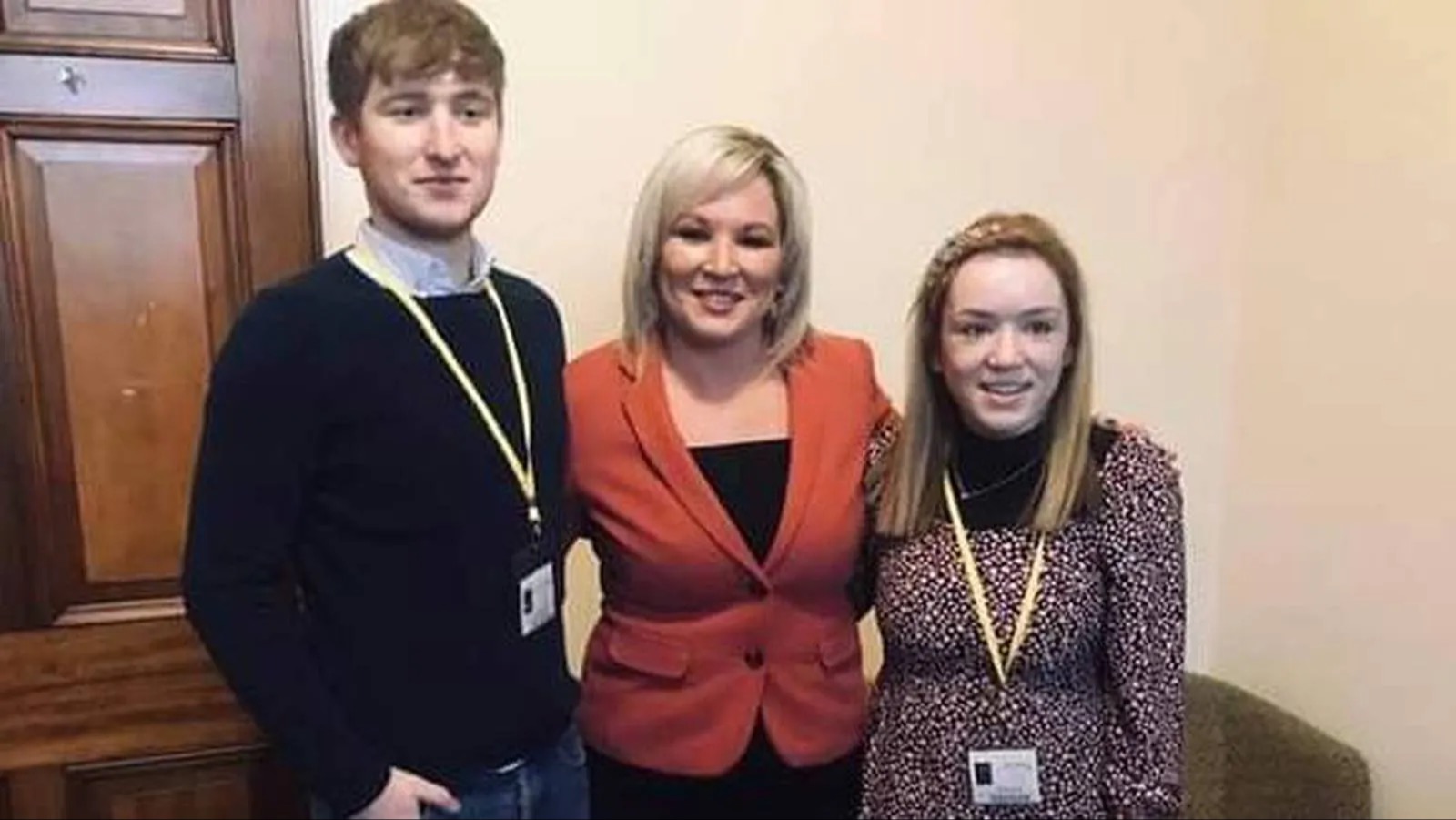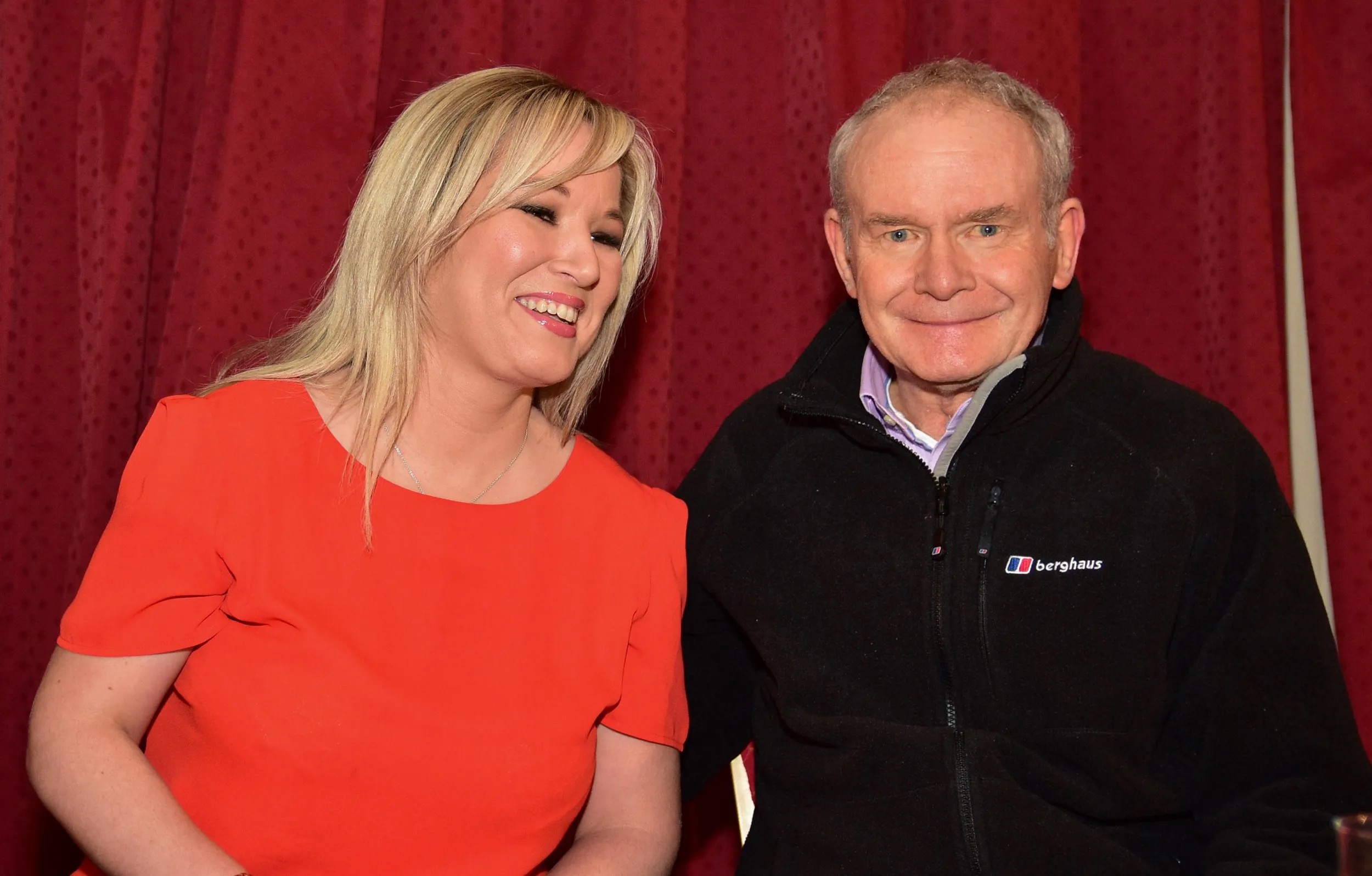
IT has been a historic week of firsts for Sinn Fein Vice President Michelle O’Neill.
The first nationalist to take the first minister post in Northern Ireland, and the first Sinn Fein politician to attend a PSNI passing out event.
Here JASON JOHNSON looks at the rise of a trailblazing republican leader who dreams of sitting in Dail Eireann in a united Ireland.
MICHELLE O’Neill faced only one challenge to her position as Sinn Fein vice president — but he hadn’t a hope.
John O’Dowd MLA could deliver the party message with the best of them, but the incumbent was the embodiment of its direction.
No one was surprised when O’Neill had almost 70 per cent backing from members at the 2019 Ard Fheis.
READ MORE IN OPINION
There was confidence at the top that she was the right choice. Her credentials were impeccable.
The daughter of a former IRA prisoner, O’Neill had been a teenage mum driven forward by outdated judgments at her Catholic grammar school.
Committed to argument over aggression, she was a Republican who had joined Sinn Fein the year the Good Friday Agreement was struck.
Now, after a flawless honeymoon week of firsts as Northern Ireland’s first nationalist First Minister, it is game on.
Most read in The Irish Sun
Together with DUP Deputy First Minister Emma Little-Pengelly, she needs to navigate a way out of the budget crisis gripping the public sector.
First minister for all
Yet, along the way, the 47-year-old mother of two will keep her eye firmly on her hope of one day taking a seat in Dail Eireann in a newly united Ireland.
Growing up in rural Clonoe, Co Tyrone, O’Neill has said the conflict was not often discussed at the dinner table — there was enough of that going on outside.
She said: “It was all around you, you grew up in the midst of conflict.
“The behaviour of the British security forces, the harassment, the intimidation was all around me.
“Early morning raids on people’s homes — and my own home — the fact that my father was taken away and incarcerated, interned, that’s your lived experience.”
O’Neill attended St Patrick’s Academy in Dungannon and, as a 16-year-old student, gave birth to her first child, Saoirse.
Family helped care for her daughter while O’Neill finished her A-levels and trained as a welfare rights adviser.
She married her daughter’s father Paddy O’Neill at the age of 18 and the couple had son Ryan three years later, but separated in 2014.
O’Neill’s political career began when she replaced her father on Dungannon Borough Council in 2005.
In 2007, she was elected to the Stormont Assembly, working with Martin McGuinness, and Francie Molloy, who represented the same Mid Ulster constituency.
'Strong successor'
Molloy said the new arrival was “a good listener,” who mulled things over before responding.
Her ambition growing, she was selected to speak for Sinn Fein on health. Then, in 2011, she was appointed agriculture minister.
In 2015, she took over the health minister portfolio, where, in line with her progressive views, she lifted the lifetime ban on gay men donating blood.
Within two years, she was singled out as a strong successor to the ailing Martin McGuinness and, a year later in 2018, she was elected vice president in a party refreshed by the leadership of Mary Lou McDonald.
In 2020, O’Neill secured the deputy first minister role, working closely with the DUP’s Arlene Foster through turbulent times, not least the Covid pandemic
And, in 2022, history was made when Sinn Fein finally became the biggest party in Northern Ireland at the Assembly elections.
Post-Brexit wrangles ensured that her title was no more than ‘first minister-designate,’ but that all changed when Stormont restarted last weekend.
During her career, O’Neill’s attendance at commemoration events for IRA members has raised many questions among unionists.
Yet, at the same time, it has provided answers for Republicans concerned the party may seek to play down its roots.
Calls for her to resign as deputy first minister after attending the 2020 funeral of republican Bobby Storey at a time of strict pandemic restrictions on gatherings failed to wound her.
First minister for all
And her 2022 comment that there was “no alternative” to the IRA’s armed campaign, despite its bleak tally of 1,700 murders, further locked in the endorsement of those who backed it.
In the same year, she attended the funeral of the Queen and, in 2023, the coronation of King Charles.
As a measure of changing times, criticism from Republicans was minimal, while unionists signalled their respect for what she had done.
O’Neill responded: “I had said I would be a first minister for all.”
In the past week, she has hit the ground running, referencing the name of the state, Northern Ireland, in her inaugural speech — neutralising a unionist bugbear on day one.
And on Friday, she broke new ground by attending a passing out parade for new recruits to the PSNI, a fulsome endorsement of the state’s police service.
The times ahead will see her work to warm the relationship with nationalists not minded to vote Sinn Fein and to ease the conversation with unionists who never will.
But first, in line with her stated priority, some hard decisions around cuts, rates, charges and taxes must be taken on her watch.
A concerted push — together with party president Mary Lou McDonald — for a referendum on Irish unity will have to wait . . . but, surely, not for long.










